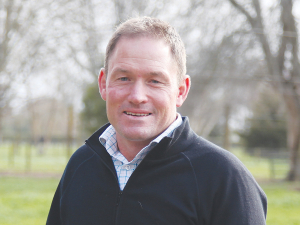LIC lifts half-year revenue on strong demand for dairy genetics
Herd improvement company LIC has posted a 5.2% lift in half-year revenue, thanks to increasing demand for genetics.
 LIC’s general manager New Zealand markets Malcolm Ellis believes the writing was on the wall last year when their data revealed that the national submission rate was down by 1.3%.
LIC’s general manager New Zealand markets Malcolm Ellis believes the writing was on the wall last year when their data revealed that the national submission rate was down by 1.3%.
One of the highest numbers of empty cows in recent years could cost the dairy industry more than $20 million next season.
It will also have huge implications for the meat industry with more cull cows destined for processing and this in turn could have implications for export returns for beef and dairy.
The latest interim statistics just released by LIC are based on data from 4,000 farms representing about two and a half million cows.
According to LIC's general manager New Zealand markets Malcolm Ellis the writing was on the wall last year when their data revealed that the national submission rate was down by 1.3%.
"To put some context around this, I have been in this role with LIC for seven years and up until now the national variance rate has been about point three of a percent (0.3%), so this year's 1.3% is really significant," he says.
Ellis sasy in past years the highs and lows of regions have evened out the numbers and he says, even this year, the higher submission rates in the South Island stopped the numbers being even worse. He says the consequences of the low submission rate means that one percent fewer cows in the national herd will not calve in the first six weeks of the spring.
"I calculate that this will result in 2.7 million kgMS not being produced and effectively lost," he says.
The consequence of the cows not getting pregnant, says Malcolm Ellis, is the empty rate for this coming season is likely to be around 17.2%. He says last year the final empty rate was 16.2% and over the years has hovered between 15% and 16%.
Ellis says it's unlikely the interim numbers for this year will change muh, although there is a possibility there will be some very late calvers.
But the problems don't end with the loss of milk production - it's the flow-on effects of the higher than normal empty rate right across the meat and dairy sectors.
"As a result of this, freezing works are very concerned at this because that extra 1% of empty cows on a 4.8 million cow population means that potentially an additional 48,000 empty cows will be heading to the works.
"Sure, there will be some empty cows retained by farmers, but the point is, this will put a challenge on meat works and also the seasonal supply and demand on the meat schedule," he says.
Ellis says that combined with the nervousness of a lower milk price, the empty rate will add to the woes of farmers. He says in light of this, he predicts many farmers will 'milk deep' this season given that grass covers are good and the weather favourable.
As for the reasons for the higher than normal empty rate, Ellis says the weather last year was certainly a contributing factor.
"Also, I think there was a lot of farmer fatigue going into the winter and spring.
"You don't have to be much off your game to make slightly poorer farm management decisions. We do know there was a genuine skill shortage on-farm and we often had quite junior people making strategic decisions at key times of the year," he says.
Ellis says the interim figures represent the typical bell shaped curve, which means there are farmers with tremendous reproduction but there are also some that are well below the average.
New Zealand and Chile have signed a new arrangement designed to boost agricultural cooperation and drive sector success.
New DairyNZ research will help farmers mitigate the impacts of heat stress on herds in high-risk regions of the country.
Budou are being picked now in Bridge Pā, the most intense and exciting time of the year for the Greencollar team – and the harvest of the finest eating grapes is weeks earlier than expected.
The Real Estate Institute of New Zealand (REINZ) has released its latest rural property report, providing a detailed view of New Zealand’s rural real estate market for the 12 months ending December 2025.
Rural retailer Farmlands has released it's latest round of half-year results, labeling it as evidence that its five-year strategy is delivering on financial performance and better value for members.
OPINION: "We are back to where we were a year ago," according to a leading banking analyst in the UK, referring to US president Donald Trump's latest imposition of a global 10% tariff on all exports into the US.
OPINION: Expect the Indian free trade deal to feature strongly in the election campaign.
OPINION: One of the world's largest ice cream makers, Nestlé, is going cold on the viability of making the dessert.